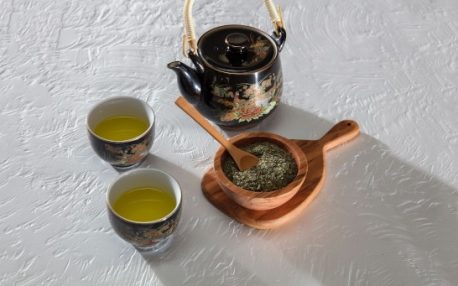As per USDA22 (US Dept. of Agriculture), one teabag of oolong tea (weighing around 2g) contains:
- Energy – 0 kcal
- Protein – 0 g
- Fat – 0 g
- Carbohydrate – 0 g
- Sugar – 0 g
- Potassium – 9 mg
- Sodium – 1 mg
- Cholesterol – 0 mg
This would, of course, be values that exclude any additives that you may add to Oolong tea for taste like sugar, milk, lemon etc5 (Wikipedia).
BENEFITS OF OOLONG TEA
01
Promotes Oral Health
Oolong tea may help in improving oral health and protects teeth.
An older study1 (Matsumoto et al., 1999) indicated that Oolong tea extracts may inhibit the caries-inducing activity of mutans streptococci by reducing the rate of acid production. The polyphenols in Oolong tea were also suggested to inhibit bacterial adherence to the teeth.
An older study12 (Ooshima et al., 1993) in rats showed results that indicated that oolong tea polyphenolic compounds could be useful for controlling dental caries by inhibiting the action of mutans streptococci.
Results from a 1999 study14 (Matsumoto et al., 1999) suggest that Oolong tea extracts may inhibit caries-inducing (decaying) activity of mutans streptococci by reducing the rate of acid production.
Other studies13 (Ferrazzano et al., 2009) carried out on green, oolong and black tea indicate that tea polyphenols exert an anti-caries (anti-decaying) effect through an anti-microbial mode-of-action and has possible application in the prevention of pathogenesis of dental caries.
02
Reduce the Risk of Type-2 Diabetes
Oolong tea may help reduce the risk of type-2 Diabetes.
A 2003 study2 (Hosoda et al., 2003) conducted in Taiwan suggested that Oolong tea may be an effective supplement in the treatment of type 2 diabetes.
A study3 (Iso et al., 2006) among Japanese subjects in 2006 observed a reduced risk of type-2 diabetes among people who consumed caffeine from Green tea, Black tea, Oolong tea and Coffee.
A 2011 study10 (Yasui et al., 2011) in rats that monitored intake and effects of Oolong tea over 4 weeks resulted in findings that suggest that drinking oolong tea may help to prevent diabetes.
03
Reduce the Risk of Coronary Artery Disease (CAD)
A randomized study4 (Shimada et al, 2004) in which researchers observed the effect of the subjects who consumed 1000 ml of Oolong tea or water for 1 month suggested that Oolong tea may have beneficial effects on the progression of atherosclerosis (deposition of fat in the inner walls of arteries) in patients with CAD.
A follow-up study11 (Mineharu et al., 2011) on 76,979 individuals aged 40-79 years free of stroke, Coronary Heart Disease (CHD) and cancer at entry was conducted in 2011. It showed that consumption of coffee, green tea and oolong tea and total caffeine intake was associated with a reduced risk of mortality from cardiovascular diseases.
Data from an observational study15 (Li et al., 2017) in 2017 from the largest prospective cohort of Chinese adults (512,891 participants aged 30–79) showed that daily tea consumption (Green/Black/Oolong) was associated with a decreased risk of Ischemic Heart Disease (IHD) incidence.
04
Reduce the Blood Pressure
Oolong tea may reduce the risk of hypertension.
A 2004 study6 (Yang et al., 2004) among 1507 subjects of the Chinese population (men and women aged 20 years or older) found that habitual consumption of Oolong or Green tea of moderate strength (120 ml per day or more) for 1 year resulted in a significant reduction in risk of developing hypertension.
A 2008 study16 (Tanida et al., 2008) in rats found that drinking Oolong tea for 14 weeks reduced Blood Pressure (BP) elevation in spontaneously hypertensive rats.
05
Weight Loss
Resting Energy Expenditure was found to increase by 2.9 to 3.4% (compared to that of water consumption) during a study7 (Rumpler et al., 2001) in people who drank Oolong tea (brewed from 15 g of tea on a daily basis for 3 days). Fat burn was also noted to have increased by about 12% as a result of this.
In 2009, a study8 (He et al., 2009) was conducted in 102 diet-induced obese subjects who consumed a total of 8 g of oolong tea a day for 6 weeks. The results indicated that 70% of the severely obese objects showed a decrease of more than 1 kg in body weight. This included 22% of the total who lost more than 3 kg. It concluded that Oolong tea could decrease body fat content and reduce body weight through improving lipid metabolism.
Another 2018 study9 (Wu et al., 2018) in high-fat diet-induced Sprague-Dawley rats also suggested that drinking Oolong tea might be a potential therapy for the treatment of obesity.
06
Improve Cognitive Ability
Studies17 (Arab et al., 2013) have indicated a correlation between tea (in general) and coffee consumption to a reduced risk of loss of cognitive ability, especially in older women.
A review18 (Song et al., 2013) of population-based studies in 2013 suggests that tea drinking has beneficial effects on cognitive function of elderly persons.
A 2008 study19 (Ng et al, 2008) conducted among community-living Chinese adults aged 55 and above on the potential neurocognitive protective effects of tea (in general) showed that regular tea consumption was associated with lower risks of cognitive impairment and decline.
07
Treat Dermatitis
Eczema or Dermatitis is used to describe different types of skin swelling. Most types cause dry, itchy skin and rashes on the face, inside the elbows and behind the knees, and on the hands and feet20 (Medline Plus).
Out of 118 patients (who suffered from Eczema) who completed a study21 (Uehara et al., 2001) to find the beneficial effects of Oolong tea in treatment of Eczema, 74 (63%) of them showed marked to moderate improvement in their condition within 1 month.
It was also observed that the effect persisted even at 6 months for 54% of the patients indicating long-term efficacy. The scientists came to the suggestion that the anti-allergic properties of tea polyphenols in Oolong tea may have a therapeutic effect on recalcitrant Eczema.
Risks Associated with Over-Consumption

The keyword here, just like in most other places, is moderation.
Acute consumption of Oolong tea was observed to raise the blood glucose in a study23 (Hayashino et al., 2011) conducted among working men. Higher level of blood glucose may be an indicator of the risk of diabetes. It was not, however, concluded that this will lead to the development of diabetes and was rather considered as an area of interest for future studies.
There was an isolated incident24 (Layher et al., 2013) in which a 72-year-old male experienced heart attack-like symptoms immediately after the consumption of high-quality Oolong tea. This patient also had a history of a similar reaction when drinking concentrated Green tea. However, these turned out to be heart attack-like symptoms and did not uncover any other malfunction to his heart.
Oolong tea is a member of the family of other teas (like Black and Green) so it would have similar benefits and risks. To know more about the risks associated with tea consumption27, check out our article on the same.
References

